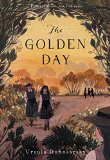Summary | Excerpt | Reviews | Beyond the Book | Readalikes | Genres & Themes | Author Bio

Critics' Opinion:
Readers' Opinion:
First Published:
Aug 2013, 160 pages
Paperback:
Apr 2015, 160 pages
 Book Reviewed by:
Book Reviewed by:
Tamara Ellis Smith
Buy This Book
"People need poetry, but they won't pay for it," Miss
Renshaw explained. "The great hope of a poet, girls, is to find a
patron. Someone who will provide them with money and even a
haven of peace and tranquillity while they write their poetry."
"Like a husband," suggested Georgina.
"In some ways," conceded Miss Renshaw, a little frostily.
"Why do you need money? Is it very expensive to write
poetry?" asked Cubby, puzzled.
"It's hard to have a job when you're writing poems," said
Cynthia in a worldly sort of way.
Why? wondered Cubby, although she did not say so out
loud. Her father took the train to work and back every morning
and evening, twenty minutes each way into the city. He could
write a poem every day on the train in both directions. At that
rate, he could write ten poems a week.
But not Morgan. Morgan was a real poet — poor,
handsome, clever, and even famous, Miss Renshaw said, if you
spoke to the right people.
"Are his poems in books?" asked the oldest Elizabeth.
"Morgan is widely published," said Miss Renshaw evasively.
"Can you write poems too, Miss Renshaw?" asked Bethany,
with her big eyes.
"We can all write poems," replied Miss Renshaw, "if we
allow ourselves. But we need to feel free to write poetry. We
need to stop thinking of the facts, and think more about our
feelings."
"Let it all hang out," agreed Cynthia.
Cubby pictured the family washing on the clothesline in
the backyard — shirts, skirts, shorts, and underwear, spinning
in the wind.
"How do you write a poem?" asked long-haired Elizabeth,
tossing her tight black plaits back over her shoulders.
"Aha!" said Miss Renshaw. "Now, that is the question. You
need to get out of here to write real poetry. You need to get
away, outside these walls, these floors."
She stamped her foot on the linoleum beneath them,
splotched with old chewing gum and the remains of crawling
insects. She stamped on the overhanging gloom of indoors, the
narrow benches, the damp bricks, and the chapel of hidden
windows, wood and brass and cloth.
"You must look up into the sky, open your minds, your
eyes, your hearts! Poems will appear in the open air!" Miss
Renshaw cried. "You need to reach out and grasp the words
from the sunlight. Most of all, you must stop thinking. That's the
real secret. Stop thinking."
How? thought Cubby. How can you stop thinking?
"We must get away from this place," said Miss Renshaw,
shaking her springy head. "Away from this school, this institution.
Then we can find true poetry. To go far, far away into
nature, grass, water, the huge sky, and the deep brown earth."
Although, not that far, it turned out. Just as far as the
Ena Thompson Memorial Gardens. Back they went, several
times, with pencils and sheets of lined paper, to write poetry.
Miss Renshaw did not write any poems, though, not that
they saw.
"Run away, girls," Miss Renshaw would say as they passed
through the archway into the gardens. "Go and listen to the
running water, then pick up your pencils and write a poem
about it. I will stay here in the shade and talk with Morgan."
Obediently, gladly, the little girls would run away through
the heavy-branched trees and careful rosebushes, across the
samples of grasses from South America. They would stand and
listen to the bubbling fountain, and the clip-clopping of the
ducks as they paddled about the glossy pond.
This was just the sort of thing you should be able to write a
poem about. But when Cubby listened to the fountain, it only
made her think of the broken cistern in the toilets under the
gym, mossy and dank and smelling like a dead body mixed up
with old cartons of rotting milk. You couldn't write a poem
about that, could you? Although Icara said you could write
poems about horrible things just as much as beautiful things.
Excerpted from The Golden Day by Ursula Dubosarsky. Copyright © 2013 by Ursula Dubosarsky. Excerpted by permission of Candlewick Press. All rights reserved. No part of this excerpt may be reproduced or reprinted without permission in writing from the publisher.





The House on Biscayne Bay
by Chanel Cleeton
As death stalks a gothic mansion in Miami, the lives of two women intertwine as the past and present collide.

The Flower Sisters
by Michelle Collins Anderson
From the new Fannie Flagg of the Ozarks, a richly-woven story of family, forgiveness, and reinvention.

The Funeral Cryer by Wenyan Lu
Debut novelist Wenyan Lu brings us this witty yet profound story about one woman's midlife reawakening in contemporary rural China.
Your guide toexceptional books
BookBrowse seeks out and recommends the best in contemporary fiction and nonfiction—books that not only engage and entertain but also deepen our understanding of ourselves and the world around us.